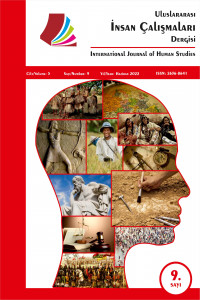The Return of Freudian Remnants: The Oedipal Conflict and Jealousy in Suat Derviş’s Ne Bir Ses Ne Bir Nefes
Öz
Anahtar Kelimeler
Oedipus Complex Suat Derviş Ne Bir Ses Ne Bir Nefes Novel Turkish Literature
Kaynakça
- Derviş, S. (2020). Kara Kitap. İstanbul: İthaki.
- Fear, R. (2015). The Oedipus Complex: Solutions or Resolutions?. London: Karnac Books.
- Grosz, E. (1990). Jacques Lacan: A Feminist Introduction. New York: Routledge.
- Freeman, T. (2008). Psychoanalytic Concepts of Fatherhood: Patriarchal Paradoxes and the Presence of an Absent Authority. Studies in Gender and Sexuality, 9(2), 113-139. Doi: 10.1080/15240650801935156
- Freud, S. (1976). The Complete Psychological Works of Sigmund Freud. New York: W. W. Norton & Company.
- Freud, S. (1989). The Ego and the Id. New York: W. W. Norton & Company.
- Freud, S. (1980). The Interpretation of Dreams. New York: Avon.
- Marty, F. (2017). Ergenlikte Anne ve Baba Katilliği Üstüne. Psikanaliz Yazıları: Bireysel ve Toplumsal Travmalar II (ss. 151-166). İstanbul: Bağlam.
- Spiro, M. E. (1983). Oedipus in Trobriands. Chicago: Chicago University Press.
Freudyen Kalıntıların Geri Dönüşü: Suat Derviş’in Ne Bir Ses Ne Bir Nefes Romanında Ödipal Çatışma ve Kıskançlık
Öz
Anahtar Kelimeler
Oidipus Kompleksi Suat Derviş Ne Bir Ses Ne Bir Nefes Roman Türk Edebiyatı
Kaynakça
- Derviş, S. (2020). Kara Kitap. İstanbul: İthaki.
- Fear, R. (2015). The Oedipus Complex: Solutions or Resolutions?. London: Karnac Books.
- Grosz, E. (1990). Jacques Lacan: A Feminist Introduction. New York: Routledge.
- Freeman, T. (2008). Psychoanalytic Concepts of Fatherhood: Patriarchal Paradoxes and the Presence of an Absent Authority. Studies in Gender and Sexuality, 9(2), 113-139. Doi: 10.1080/15240650801935156
- Freud, S. (1976). The Complete Psychological Works of Sigmund Freud. New York: W. W. Norton & Company.
- Freud, S. (1989). The Ego and the Id. New York: W. W. Norton & Company.
- Freud, S. (1980). The Interpretation of Dreams. New York: Avon.
- Marty, F. (2017). Ergenlikte Anne ve Baba Katilliği Üstüne. Psikanaliz Yazıları: Bireysel ve Toplumsal Travmalar II (ss. 151-166). İstanbul: Bağlam.
- Spiro, M. E. (1983). Oedipus in Trobriands. Chicago: Chicago University Press.
Ayrıntılar
| Birincil Dil | Türkçe |
|---|---|
| Konular | Sanat ve Edebiyat |
| Bölüm | Makaleler |
| Yazarlar | |
| Yayımlanma Tarihi | 30 Haziran 2022 |
| Gönderilme Tarihi | 12 Kasım 2021 |
| Kabul Tarihi | 24 Mart 2022 |
| Yayımlandığı Sayı | Yıl 2022 Cilt: 5 Sayı: 9 |



